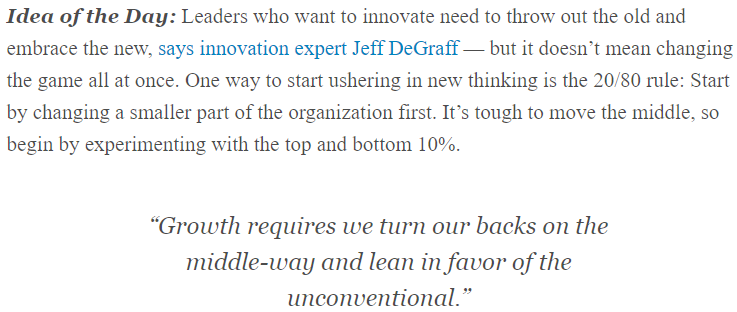LinkedIn does a “Daily Rundown” everyday. Curated by LinkedIn’s finest editors, it’s an article that lands in your notifications very early in the morning, every morning, to give you the scoop on what professionals are discussing across the globe. These articles cover everything from the economy and politics to sports and social media trends.
My favorite part of the Daily Rundown is the “Idea of the Day” portion, usually a quote from a forward thinking, successful professional. Recently, one of these quotes particularly stood out to me:
 |
| Source: LinkedIn Daily Rundown and Jeff DeGraff.com |
This made me think about the insights industry. There are many leaders in market research, but how many of us are innovators? How many are adapting and experimenting with the new technologies and methodologies?
We need to be innovators as much as we are researchers, but to get there we have to begin asking ourselves the hard questions:
Have you accepted your research limitations?
Yes, we've been trained to accept our limitations. But, that needs to be changed.
Many of us are okay with the fact that we don't know if our participants are responding attentively, accurately, or honestly on a survey. We're all armed with various versions of the same rebuttal:
Research has come far in the sense that we’ve developed techniques to ensure reliability and internal consistency, such as split-test and test-retest techniques. On the other hand, we’ll must assume respondents won’t always answer truthfully to more sensitive questions. We also understand we cannot always rely on human memory.
With advanced technology, there’s now ways to improve your methodologies to decrease these limitations.
Do you know the new possibilities?
Since most of our market research is now taking place online, it's now easier than ever to acquire information from panelists. These are just a few examples of how we can now collect data like never before: Online surveys, online mystery shoppers, MROCs, and mobile diaries.
On top of that, online data collection has practically eliminated the manual data input process, making analyzing data much easier than it used to be. Yes, there’s a trend here: Evolving tends to positively correlate with easing.
Online research has already made acquiring sample and analyzing data easier. But, there’s even more in store for us: A solution to our research limitations, online behavioral research and its many forms. For example, with passive metering (a popular form of online behavioral research), you’re able to access much more detailed information than cookie data, such as: cross-device data, browsing history, app usage, and search terms.
With passive metering technology, you can generate insights about your competitors, specific audiences, popular apps, search terms, and consumer activity; all without having to ask in the form of a survey and worrying about the accuracy. Oh, what a world!
Should you embrace the new?
New technologies are always intimidating, it's a common theme when the new replaces the old. Remember how distrustful everyone was when emails replaced letters, GPS replaced maps, and smartphones replaced (most) landlines?
Depending on your age, you definitely remember the uneasy transitions. For those of you born and raised in the tech era, I’m sure it’s difficult to fathom such a world existed.
No matter your age, we can all agree that it’s hard to imagine where we would be without smartphones, let alone all the other new, life changing innovations we’ve been gifted with. But when they were first introduced, we were uneasy. We're the same way when it comes to new research.
The idea that the insights industry is being shaken up by new research methods makes you uneasy. It makes us all uneasy. We’re naturally uncomfortable with the unfamiliar. But you know what’s more uncomfortable? Falling behind.
The longer we wait to adapt to our ever-changing industry and clients, the more we will fall behind our competitors. For the sake of better business, research and insights: Evolving is inevitable.
Do you have to embrace everything at once?
Do not abolish surveys, mobile diaries, MROCS or any declarative research methods! That’s not what we want. Don’t even dive into behavioral research yet. First, educate yourself about what behavioral research is and how it can improve your insights (and business). Then, using the 20/80 rule, test the waters by weaving behavioral into your classic methods.
A simple suggestion of how to slowly incorporate behavioral research into your current methods: Include questions on your surveys that can be answered with behavioral data, acquire that behavioral information with passive metering, and then compare the different forms of results.
You’ll be surprised to see behavioral data can provide you with much more accurate data than forms of declarative data. Then you’ll be wondering about all the ways you can utilize behavioral—just like any innovative leader would.
My only issue with the Jeff DeGraff Idea of the Day is that they didn't mention the most critical element of being innovative: Educating yourself. I strongly believe before committing to an innovative idea, you must do your background research. We recommend you do exactly that with behavioral data. That’s why we’ve developed the free Behavioral Data 101 e-Book to teach you everything you need to know (and more).

Have questions that aren’t answered in our e-Book? Our team is open ears: Get in touch with us.





